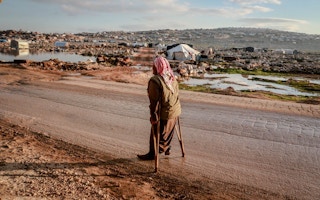Globally, more than a billion people have a disability. Most live in poverty and 80 per cent live in low- and middle-income countries, which are more susceptible to climate disasters. Because of this, and sometimes because they are also members of other minorities, disabled people are much more likely to experience the worst impacts of climate change.
People with disabilities are two to four times more likely to be hurt or die in climate-related disasters such as heatwaves, wildfires and floods.
During the 2017 flooding in rural New South Wales in Australia, those with disabilities were disproportionately impacted by unstable housing, displacement, and post-traumatic stress disorder.
When northern Bangladesh faced unprecedented flooding in June 2022, many with disabilities did not receive sufficient support from the government to reach safety and access to shelter, healthcare, and food.
Sidelined in climate conversations
Even though the disability community is especially at risk from climate change, there has been a significant lack of attention from researchers, activists and government officials when it comes to studying and addressing climate change planning for this group.
The only international disability-specific policy is the 2006 United Nations Convention on the Rights of Persons with Disabilities, which mandates that people with a disability are entitled to equality and freedom discrimination. The 2013 Incheon Strategy, specific to Asia and the Pacific, encourages disability-inclusive disaster preparedness by linking the strategy’s goals to the UN’s Sustainable Development Goals.
Apart from these, people with disabilities are frequently left out of the planning and response strategies for climate-related disasters, exposing them to higher risks during extreme weather events and other emergencies tied to climate.
Furthermore, buildings and infrastructure are often not accessible, making it challenging to evacuate or access emergency services during a disaster. Many emergency management plans and policies fail to consider the specific needs of people with disabilities, heightening their vulnerability during disasters.
Various factors contribute to this exclusion, such as the absence of accessibility in emergency shelters and communication systems. Barriers to safe evacuation can be even greater for those with mobility aids, wheelchairs or requiring a guide dog.
The failure to incorporate inclusive planning and response measures can leave people with disabilities even more susceptible to the adverse impacts of climate change.
Disability climate justice
An equitable approach to climate change vulnerability recognises that certain groups — including people with disabilities — are more susceptible to its effects.
Disability-inclusive climate justice advocates for all people with disabilities, but also takes into account other intersecting inequalities that make disabled people particularly vulnerable to exclusion from disaster planning, natural hazards and their aftermath.
Race, class, gender and nationality all affect disabled people’s access to resources — or whether their community even has the proper resources. The harm caused by colonial history, which itself has contributed to the crises we face with the environment and society, influences how well different groups can adapt.
Disability climate justice seeks equitable access to resources, including information to help with planning and adaptation to climate-related risks.
There’s no single solution, but change can start here
There is no single solution to disability inclusion, as people with different disabilities may have distinct needs. However, the responsibility should not be left on the individual to create their own accommodations and be constantly prepared for disaster to strike.
Ideally, individuals with disabilities should part of planning for climate resilience. Turning to people with disabilitiesto take charge in leadership and disaster planning, at all levels, could help with effective change, as they can recognise disability-specific needs and what resources are lacking.
Diversifying activism and policy advocacy in terms of disability — as well other identities like age, race and ethnicity, and location – would facilitate solutions that work for everyone and help people shape the future they want to live in.
Creating accessibility for everyone in programs aimed at generating green jobs, along with implementing policies that advocate for disability inclusion during transitions, provides a chance to enhance climate change adaptive capacity.
Ultimately, incorporating individuals with disabilities into discussions about climate adaptation planning will strengthen the resilience of communities.
Molly M. King is an assistant professor in Santa Clara University’s Sociology Department whose work focuses on inequalities in information and knowledge and the implications of these inequalities for people’s lives. Her current projects focus on scientific careers and knowledge about climate change.
Additional reporting and contribution by Christina Nelson, who is a research assistant for King and a 4th year Sociology, Spanish, and Sustainable Food Systems student at Santa Clara University.
Financial support for related research was generously provided by a College of Arts and Sciences Dean’s Grant and an Environmental Justice and the Common Good Initiative Research Grant at Santa Clara University.
Originally published under Creative Commons by 360info™.









